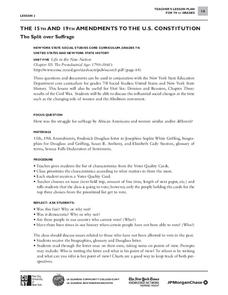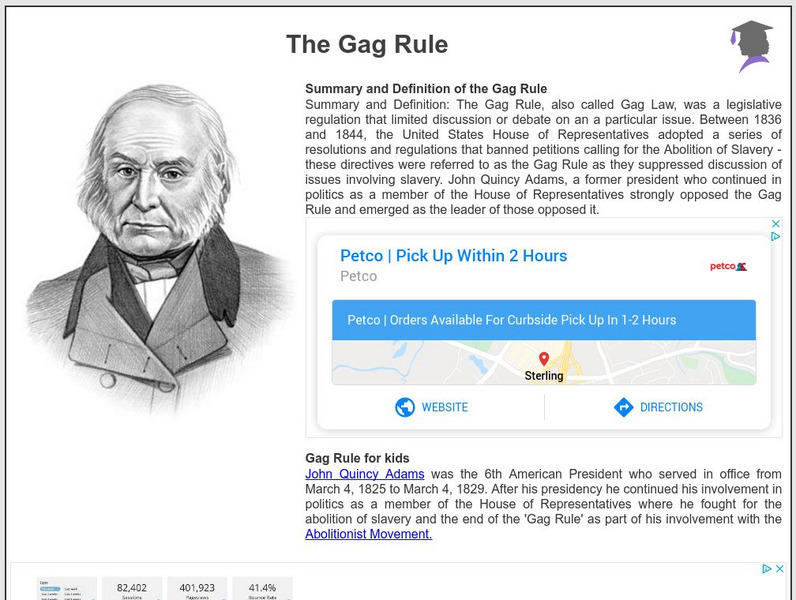C.S. Lewis Foundation
Study Guide to The Abolition of Man
A first-rate resource that tackles the complexity of C.S. Lewis’s The Abolition of Man. It provides a clear plan for analysis, discussion, and exploration. The two sets of questions focus readers to concentrate on the text itself, or to...
Curated OER
A House Dividing: The Growing Crisis of Sectionalism in Antebellum America
Students explore the debates over American slavery and the power of the American federal government for the first half of the 19th century and how the regional economies and political events produced a widening split between the states.
Heritage Foundation
Slavery and the Constitution
It's hard to believe the abolition movement was once seen as scandalous. Help learners understand how the US Constitution changed everything. A variety of activities such as corresponding reading activities, group work ideas, and...
City University of New York
The 15th and 19th Amendments to the U.S. Constitution
Who gets to vote? Learn more about struggles for suffrage throughout United States history with a instructional activity based on primary source documents. Middle schoolers debate the importance of women's suffrage and African American...
Center for History Education
Slavery and Civil Disobedience: Christiana Riot of 1851
When is it a moral obligation to disobey the law or to fight back? Using primary sources that document the "Christiana Riot" of 1851, learners consider these questions. The firsthand accounts tell the story of the riot, which happened...
Center for History Education
Speaking Up and Speaking Out: Exploring the Lives of Black Women During the 19th Century
Young historians investigate the often-hidden history of free and enslaved African American women before the Civil War. Using a collection of primary and secondary sources, including speeches, diaries, and poems, they evaluate the often...
Curated OER
The death penalty; What is your view?
Learners write a persuasive essay about the death penalty. Students respond to learners at St. Ignatius Catholic High School in Cleveland protesting the death of Adremy Dennis. Students research both sides of the debate, before writing...
Curated OER
The Great Debate Lesson Plan: Slavery in the U.S. Constitution
Learners examine the U.S. Constitution to see what has been writte about slavery. Then, students, in groups, research the Constitutional Convention of 1787 to explore slavery compromises.
Curated OER
Slavery and the Legal Status of Free Blacks: Rhetorical Analysis of Debates During the 1847 Illinois Constitutional Convention
Eleventh graders read actual arguments regarding the status of free blacks in Illinois and slavery in the United States more generally.
Curated OER
The Senate : Retention, Abolition, Reform
Students examine the strengths and weaknesses of the Senate in the Canadian Parliament. The role of the Senate is probed as its usefulness is scrutinized.
Curated OER
Debate - Election of 1876
Eleventh graders examine how Rutherford Hayes should be elected President of United States in order for the Union to continue effective Reconstruction.
Curated OER
The Anti-Slavery Movement
Eleventh graders as a class create and write a constitution for an anti-slavery society. They investigate demographics of slavery, treatment of slaves, the colonization movement, and women in the abolition movement, and present their...
Curated OER
The Unfinished Lincoln Memorial
Students develop a list of images of President Abraham Lincoln: for example, self-taught youth, great debater, advocate of abolition of slavery and assassinated hero. They must determine if these images of Lincoln stand up under scrutiny.
Roy Rosenzweig Center for History and New Media
Reconstruction
When slavery ended, what did the government do to help African American during Reconstruction? An interesting instructional activity uses primary sources such as newspaper articles to help scholars analyze Reconstruction policies and how...
Curated OER
Abraham Lincoln, the 1860 Election, and the Future of the American Union and Slavery
High schoolers examine the political alternatives regarding the spread of slavery and the preservation of the American union facing the American people in the decade leading up to the 1860 presidential election.
Curated OER
The French Revolution
An excellent resource for a unit on the French Revolution, this informative presentation guides your class through the events of the Reign of Terror and the events preceding and following it. The slides could be easily broken up into...
James Madison Memorial Fellowship Foundation
Those "Other Rights:" The Constitution and Slavery
Did the United States Constitution uphold the institution of slavery, or did it help to destroy it? Young historians study Article 4, Section 2, Clause 3 of the Constitution and evaluate the rights of slaveowners as they compared to or...
Annenberg Foundation
Gothic Undercurrents
Terror, mystery, excitement. American writers of the 19th century, including Nathaniel Hawthorne, Herman Melville, and Emily Dickinson, used these elements to create morally ambiguous tales that challenged the prevailing belief in...
Curated OER
The Patchwork Path
Fourth graders investigate slavery by reading a book with their classmates. In this abolitionist movement lesson, 4th graders read the story The Patchwork Path, and discuss the creation of the Underground Railroad. Students create...
Curated OER
Slavery and the Legal Status of Free Blacks
Students examine the status of free blacks in Illinois and slavery in the U.S. They read and analyze primary source documents, answer and discuss questions, participate in a group discussion, and present the group's findings to the class.
Curated OER
Learning About Life as a Slave
Students explore the history of slavery. In this slavery lesson plan, students take a closer look at slavery in the Americas and the abolitionist movement as they visit the suggested museums and their websites.
Other
Online Archive of 19th Century u.s. Women's Writings: Emancipated Slaveholders
Writing in the 1840s, Lydia M. Child tells the story of ex-slavers living in Virginia. Demonstrates the complexity of the abolition debate in Pre-Civil War America.
Other
Fca Homeschool: History 806
A sample lesson plan covering the sectionalism and problems facing the nation in its debate on slavery in the 1850s.
Siteseen
Siteseen: American Historama: The Gag Rule
Details concerning the Gag Rule that limited discussion or debate on a particular issue and banned petitions calling for the abolition of slavery.

























